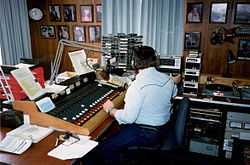Radio personality

A radio personality is a person who has an on-air position in radio broadcasting. A radio personality who performs as the host of a radio show is also known as a radio host and in India as a radio jockey.
Description
A radio personality can be someone who introduces and discusses various genres of music, hosts a talk radio show that may take calls from listeners, or someone whose primary responsibility is to give news, weather, sports, or traffic information. The radio personality may broadcast live or use voice-tracking techniques.[1]
Increasingly, radio personalities are expected to supplement their on-air work by posting information online, such as on a blog. This may be either to generate additional revenue, or to connect with listeners.[2]
History
The radio personality dates back to 1909 when Ray Newby of California made his debut for Herrold College of Engineering and Wireless.[3] By 1910, radio personalities were active across the United States.[4]
FM/AM radio personalities
FM/AM radio personalities play music, talk, or both.[5] Examples are Opie and Anthony, Howard Stern, Elvis Duran, Big Boy, Kidd Kraddick, Kellie Rasberry, John Boy and Billy, Rickey Smiley, and Barry Kaye.
Talk radio personalities
Talk radio personalities often discuss social and political issues from a particular point of view, such as conservative or liberal.[5] Some examples are Rush Limbaugh, Brian Kilmeade, Brian Lehrer, and John Gibson.
Sports talk radio personalities
Sports talk radio personalities are often either a former athlete, sports writer, or t.v. anchor and discuss sports news.[5] Some examples are Dan Patrick, Tony Kornheiser, Colin Cowherd, Mike Francesa and Chris Russo.
Satellite radio personalities
Satellite radio personalities are not subject to government broadcast regulations and are allowed to play explicit music.[5]
Salary
Radio personality salaries are influenced by years of experience and education. The median salary of a radio personality in the US is $28,400.
- 1–4 years: $15,200-39,400,
- 5–9 years: $20,600-41,700,
- 10–19 years: $23,200-51,200,
- 20 or more years: $26,300-73,000.
A radio personality with a Bachelor's Degree has a salary range of $19,600-60,400.[6]
The salary of a local radio personality will differ from a national radio personality. National personality pay can be in the millions because of the size of audience and corporate sponsorship. For example, Rush Limbaugh makes $40 million annually as part of the eight-year $400 million contract he signed with Clear Channel Communications.[7]
Career opportunities
Due to a radio personality's vocal training, there is often opportunity to expand their career. Over time a radio personality could be paid to do voice overs for commercials, television shows, and movies.[8]
Training
A person can receive training to become a radio personality. This can be done by attending a University that offers classes in radio broadcasting. For example if the university has a radio station, a student can work for the station to get training as well as course credit.[9] Internships are also very common for prospective radio personalities, as many as college students will intern at various radio stations to get the hands-on training from professionals. Training courses are also available on line.[9]
Education Requirements
Anyone wanting to become a radio personality does not need formal education but a degree in audio engineering could be a plus.[10] If a radio personality has a bachelor's degree, the degree is typically in the fields of Radio-Television-Film, Mass Communications, Journalism, or English.[11]
Job Requirements
A radio personality position generally has the following requirements:[12][13]
- Good voice with excellent tone and modulation
- Great communication skills and creativity when it comes to interacting with listeners
- Knowledgeable on current affairs
- Must be able to think outside the box
- Ability to develop your own style
See also
References
- ↑ L. A. Heberlein - The Rough Guide to Internet Radio 2002 - Page v. "In addition to putting songs together, a good radio host can tell you things you didn't know about the artists, the songs, and the times."
- ↑ Rooke, Barry; Odame, Helen Hambly (2013). ""I Have to Blog a Blog Too?" Radio Jocks and Online Blogging". Journal of Radio & Audio Media 20 (1): 35. doi:10.1080/19376529.2013.777342.
- ↑ "The Early Days: 19th Century-1940". http://iml.jou.ufl.edu/projects/fall09/bein_k/history.html''. Retrieved 5 March 2013.
- ↑ Schneider, John. "The History of KQW and KCBS San Francisco /San Jose". The Bay Area Radio Museum. Bay Area Radio Museum. Retrieved 28 February 2013.
- ↑ 5.0 5.1 5.2 5.3 "Radio and Television Job Description". CareerPlanner.com. Careerplanner.com. Retrieved 28 February 2013.
- ↑ "Disc Jockey (DJ), Radio Salary, Average Salaries". Payscale.com. Payscale.com. Retrieved 22 March 2013.
- ↑ "Rush Limbaugh Net Worth". celebritynetworth.com. celebritynetworth.com. Retrieved 28 February 2013.
- ↑ "Radio Jockey: Job Prospects & Career Options". webindia123.com. webindia123.com. Retrieved 28 February 2013.
- ↑ 9.0 9.1 University, Arkansas State. "ASU Dept. of Radio-TV". http://comm.astate.edu/radiotv.html''. Arkansas State University. Retrieved 5 March 2013.
- ↑ "Radio Jockey Education and Job requirements". educationrequirements.org. Retrieved 12 March 2013.
- ↑ http://www.bls.gov/ooh/media-and-communication/announcers.htm
- ↑ "Radio Jockey education and job requirements". educationrequirements.org. Retrieved 12 March 2013.
- ↑ cite web|url=http://www.youcareer.in/rj